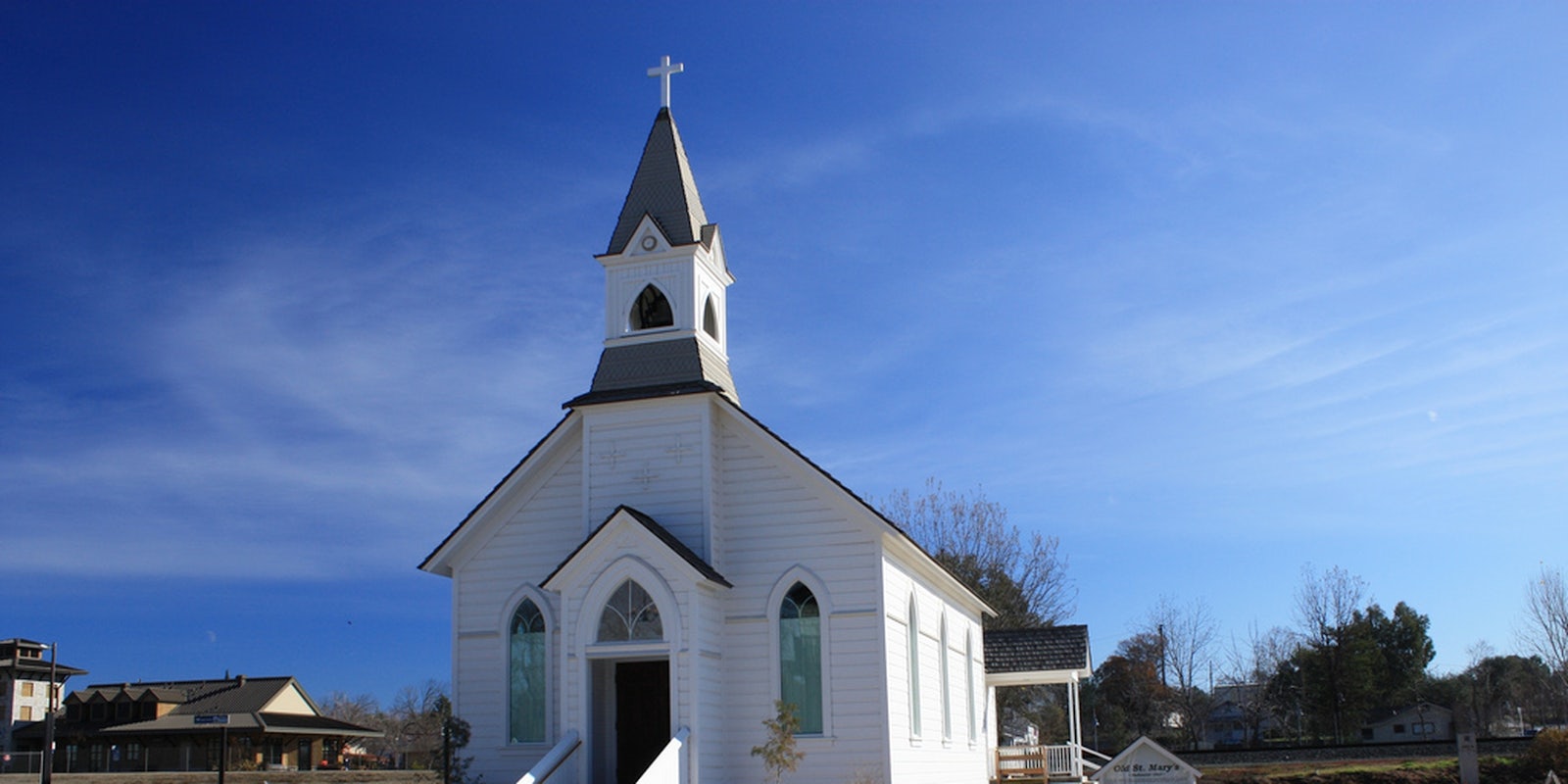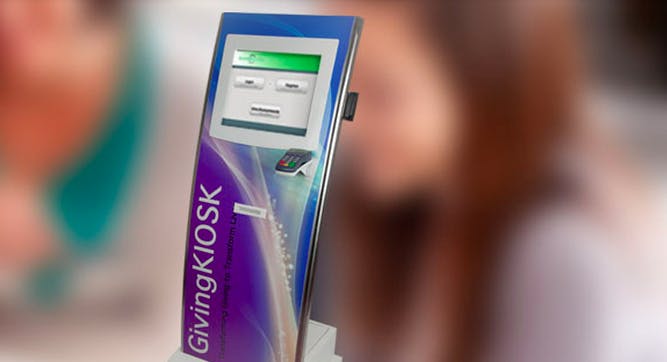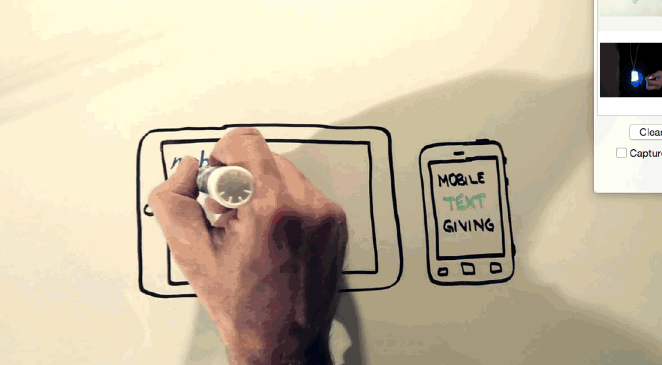On hot, sleepy Sundays, there were only a few things that could keep me awake during mass. In the stuffy church, I would stare at the individual spokes of the ceiling fans, picking one and watching it rotate, willing my eyes to stay open by forcing them to circle with it. If that strategy failed, I would make up harmony lines to the choir’s singing.
But the biggest motivation to stay awake was the donation plate.
Every Sunday, I’d squeeze my way down the pew to my mom, and stick my hands in her purse, searching for a dollar. For some reason, money made church more exciting. But like panhandlers, kids at lemonade stands, and anyone else who stood to benefit from our spare dollars and cents, the advent of digital money is hurting the church.
The solution? Church ATMs. Within the last few years, more and more congregations are installing digital giving kiosks that allow parishioners to swipe their cards and give back. It’s a sight not all that uncommon in a mall, movie theater, or grocery store, but an electronic bank set against the backdrop of a crucifix is something else entirely. It’s old school—make that oldest school—meets new.
“Churches came pretty quick when we started doing kiosks, about 10 years ago maybe,” Howard Horn of Advanced Kiosks tells me. Advanced Kiosks began as a engineering company that made custom lab equipment and later pivoted to created its own line of digital kiosk machines. One of its options includes a solution for churches. Horn says the company started with governments, hospitals, and universities, and then, churches.
“The church marketplace just wanted a quality product, and there was a lot of junk out there.”
Advanced Kiosks is far from the only company pursuing this market. “I’m very active with my church and I saw a need for an electronic giving module about four or five years ago,” Kyle Salone, who founded Free Church Kiosks, tells me via email. “Two years ago, I started developing a plan for this business and launched the R&D phase of Free Church Kiosk. I quickly saw a need outside of the church arena, for nonprofits in general, and Free Giving Kiosk was launched the same time.”
The motivations were varied: Churches wanted a system for childcare check-in, or to be used for information distribution (newsletters and announcements and such). But of course, they also wanted to take advantage of all the shiny plastic that replaced the paper in our wallets.
“Young people come in and they have cash or checks and they want to give a donation to the church… and people who only have cards can’t,” Horn says. “That was the next wave of kiosks in churches.”
But the church money machine isn’t showing up in tiny, one-room congregations just yet. Horn says that, for the most part, it’s large churches out west and in the south, those with upwards of 1,000 parishioners that are using them.
There are many kiosk options out there, aside from Advanced Kiosk’s: EasyTithe, E-zekiel, GivingKiosk; the list goes way on. While I don’t consider myself religious, I do still connect church with tradition, and these ATMs feel a bit… well, to be totally frank, money-grubbing. I’m not totally off-based with that presumption, and it’s why many of these solutions have to do more than just take your cards. “Having a kiosk just to take donations doesn’t usually work as well,” says Horn. “The kiosk has stigma, it’s the money machine. You have to make it more information and helpful.
Salone echoes this, acknowledging that, sure, there is something strange about one of the oldest organizations in the world opening up to the 21st century… at least where money is concerned. “Some older churches are or resistant to the technology,” he explains. “But as the generations change, the members attending will shift to more tech-savvy users who not only want, but expect, this convenience.”
Anyone with a wallet full of plastic is well-aware, though, of the consequences. It’s a lot easy to spend money you can’t see. Physically seeing yourself dole out the dollar bills is harder than a simple swipe. So are there any ethical implications to setting up an electronic shop for God? There’s no denying that an ATM with some religious-leaning user-facing software doesn’t feel rather cold and calculated parked next to a confessional.
It’s not just an uneasy, unfounded gut check that an ATM in a church feels wrong. There’s also the fact that organized religion hasn’t always been so great with its congregations’ money. As of 2013, tithing was responsible for generating more than $50 billion; people are consistently giving their churches a significant amount of their paychecks (“77 percent of those who ‘tithe’ give 11-20 percent of their income”). The same study also says that people who are tithing aren’t in money trouble, though it’s worth noting that more than 80 percent are in some form of debt. (Another thing worth noting is a 2009 Gallup poll that found a positive correlation between religion and poverty.)
So some people who aren’t really in a position to give, do, even though they perhaps should not. But that’s arguably not a church’s job to prevent; however, sometimes they do step in. “One pastor I worked with said ‘listen, I don’t want to take credit cards. I don’t want anyone to go into debt to give it to us. I only want debit cards,’” Horn says. An admiral position, but not a unilaterally employed one by any stretch.
There’s the larger probably, though, of whether churches are using the money responsibly. The Catholic church has had its financial scandals, and “megapastor” Joel Osteen’s alleged scam made national headlines.
Regardless, there’s a lot of motivation to go modern and adopt online giving. People are more likely to keep giving and to give more, and the visual reminder of a kiosk in the reception hall is harder to ignore than a swiftly passing plate.
But it’s difficult to pin any blame here or even decide if any should be given out: Organized religion is a business, and like any business, figuring out how to adopt technology so that your customers (er, congregations?) are connected and interested is important. And for the kiosk vendors, it’s another new market to turn into vendors. And there’s a silver lining to selling to churches, too.
“I will say this,” Horn allows. “The people we work with at the churches are the nicest, most polite, upbeat people I get to deal with.”
Photo via aresauburnphotos/Flickr (CC BY-2.0)


